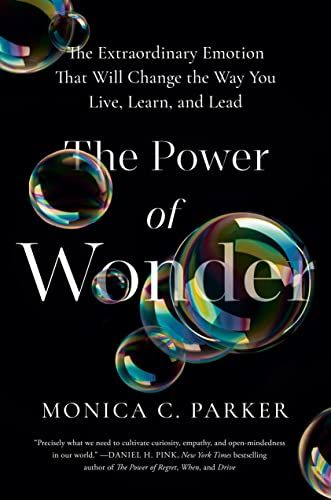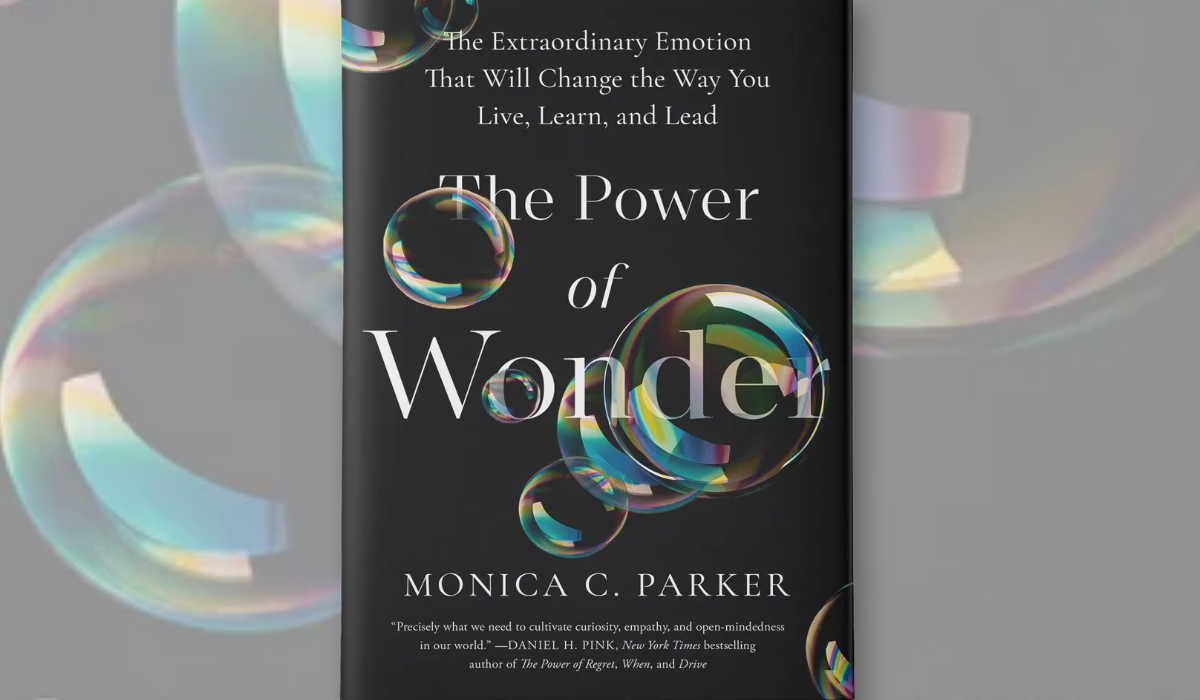This Writer Has Spent Decades Fascinated by the Power of Wonder. What She Discovered Will Change Your Life
When we make room for wonder, we invite a host of benefits. Leaning into this emotion makes us more empathetic. It strengthens our relationships and lowers our blood pressure. Research shows that wonder makes us healthier, mentally and physically, in the face of our stressful world. As Monica C. Parker writes: “I believe relentless reality breaks us and magical wonder makes us whole.”
Parker’s forthcoming book, The Power of Wonder: The Extraordinary Emotion that Will Change the Way You Live, Work, and Lead, indeed focuses on the power of this “magical, yet little-understood” emotion with a richness and thoroughness backed by years of research. It’s dense and scientific at times, but it’s also accessible, offering tangible takeaways for how we can weave more wonder into our lives. Plus, Parker—who’s been fascinated by humanity’s need for wonder since her early career days as a homicide investigator—is also forthcoming, admitting that she, too, faces anxiety and a need to be intentional about staying open to wonder’s magic. “I’m trying every day to be a little slower, a little more intentional, and to bring more novelty into my life,” she tells The Sunday Paper. “And I hope that then creates that additive spiral of more empathy, more humility, and seeking more wonder.”
But perhaps the most riveting part of Parker’s desire to shine a spotlight on wonder isn’t how the emotion helps us see all the goodness that is, but how it reveals all the greatness that can be. “So much of our life is f*cking magic,” she writes, “if only we could really see it.”
A CONVERSATION WITH MONICA C. PARKER
You’ve been curious about wonder since your time as a homicide investigator at the start of your career. How did wonder pique your interest?
I started my career designing environments. I got this opportunity to do something meaningful [as a homicide investigator]. I had intended to go to law school to help defend people on death row, but a friend of mine said, ‘before you spend a hundred thousand dollars, why don't you get up close to this work?’ I did, and that role fundamentally changed my life. I was a privileged white girl from the South. So that work, and reading Nickel and Dimed by Barbara Ehrenreich, helped me see that the world that I saw is not the world that there is. I started dealing with people who were managing existential change. I was seeing people on death row and thinking, how did they manage to still be buoyant? What I found was that it was when people saw the world with a sense of wonder. At the time I didn't have the language for it, but I saw that they were curious and hopeful. They saw the beauty in little details, in whatever they could find. That started my thinking on that journey—and I've been following that vein since.
How do you define wonder?
Wonder is something of a shapeshifter. Wonder is both the verb—to wonder—and the noun. When I started researching it, I wanted to link those two concepts into one concept of wonder. The definition that I've developed is:
· It starts with openness to experience, which is a prerequisite for curiosity to flourish.
· Then curiosity.
· Then the bridge between that verb-to-noun, which is the absorption— the point where we become prepared for that self-transcendent experience of awe.
· And then the awe.
In the book, I describe this all as “watch, wander, whittle, wow, and whoa.” I split awe into those two pieces—the wow and the whoa— for us to be transformed to create that moment of malleability in our brains that then allows the benefits of wonder to alight on us. Of course, each step has its own value and benefit, and they become cyclical. If we’re more open, we're more likely to have curiosity. And then we can add absorption, and awe can come into it. So I see it all in a holistic way.
You write that “modern life conditions the wonder-proneness out of us.” How so?
As babies, we are little wonder machines. Unfortunately, very early we start taking that out of children in the school systems. From standardized testing to teaching only for a specific end goal, this all starts to dampen wonder naturally. Then when we enter adulthood, everything in our world tells us that we need to be in a hurry. When we're rushed, we don't make time to experience wonder. And one of the points that I make in the book is that it's not always about the cognition gap, it's about recognizing the gap. If we're so busy we don't even see the gap, then we'll just move through it and we’ll miss a chance for wonder. Technology and the desire for the quick fix, the life hack takes us away from what [psychologist] Kirk Schneider calls the ‘slow simmer’ that can bring us this sense of wonder.
Why is wonder good for us? What does the research say?
The benefits are so surprising. Wonder makes us more generous, more humble, and more empathetic. People who are higher in the composite elements of wonder perform better at work and in school. They have stronger and healthier relationships. The physiological aspects of it are particularly fascinating. Wonder lowers our blood pressure, stress hormones, and pro-inflammatory cytokines. So it doesn't just create better mental health, it creates better physical health.
You make the case that wonder is more attainable than happiness. This is fascinating because we’re all trying to be happy yet so many of us simply aren’t. What have you found?
The reason I wanted to make that point is in part what you say and also because the scientists seek to make that point. Often when scientists test to prove how a prosocial emotion impacts us, they'll measure it against happiness. What we see is that the quantum of benefits from wonder are greater than happiness. But we are so poor at knowing what makes us happy. Frequently what we end up chasing is hedonic happiness: the thing, the drink, the shoes, the Viagra to give us a sense of happiness. Yet that is directly oppositional to wonder-filled happiness. So eudaimonic happiness [having meaning and purpose] is richer, but it's still not to the point of wonder.
Part of that reason is that happiness is all about a positive valence outlook. But the reality of life is that things can be oppositional. That’s what wonder does: It allows us to say the world is gray but there is also beauty, and the two can exist together. Thinking about the pandemic or the war in Ukraine, it can be really hard to be happy, but we can still be in wonder at the little moment of human kindness.
How do we start to bring more wonder into our lives?
First, start looking for what your wonder-bringers are. Are they conceptual or perceptual? Are they cognitive or social or natural? Simply think: What brings me wonder? Start using that language with other people: ‘This is my wonder-bringer, what's yours?’ It’s about starting to understand what brings us wonder individually and then trying to do more of that.
In general, what brings most people additional wonder is novelty: Doing things a bit differently. Taking it a different route. Trying to see the world in a different way.
Other things we can do include:
· Slowing down—because speed kills wonder.
· Meditation.
· Practicing gratitude.
· Narrative journaling.
· Going on a wonder walk. What makes a wonder walk a wonder walk? You decide!
There’s power in priming ourselves. To think today I am going to find wonder... I’m going to make time for wonder. It sounds simple, but it takes a little bit of practice. Once we begin to practice it, we create those new neural pathways.

Monica C. Parker is a world-renowned speaker, writer, and authority on the future of work. She has spent decades helping people discover how to lead and live wonderfully. The founder of global human analytics and change consultancy HATCH, Parker challenges corporate systems to advocate for more meaningful work lives. To learn more, visit monica-parker.com. You can pre-order her book, The Power of Wonder, here.
Question from the Editor: What, as Monica C. Parker says above, is a "wonder-bringer" for you? Let us know in the comments below!
Please note that we may receive affiliate commissions from the sales of linked products.



